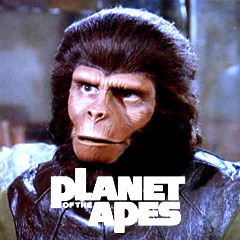
|
Greatest Movie Series |
| Conquest of the Planet of the Apes (1972) d. J. Lee Thompson, 88 minutes Film Plot Summary The film opened abruptly without a prologue (as in all the other films), beginning with the caption: NORTH AMERICA - 1991, and title credits -- almost two decades after the setting of Los Angeles 1973 in the preceding film Escape from the Planet of the Apes (1971). Various groups of slave apes in long-sleeved uniforms indicating classes or castes: red (for gorillas), yellow (for orangutans) or green (for chimpanzees), were guarded and escorted by officers wielding batons. They were led on ramps or walkways to an open courtyard or plaza in the city's Civic Center where they were being trained for slave labor to perform menial tasks: to make beds, shine shoes, carry heavy loads, set tables, sweep trash, mop floors, paint walls, wash windows, etc. A helicopter landed on the roof of the complex, where circus entrepreneur Senor Armando (Ricardo Montalban) led one of his performing chimpanzee apes ("trained as a bareback rider") on a neck leash through a security checkpoint. Armando cautioned his adult chimpanzee (Roddy McDowall), the only talking chimpanzee on Earth, that he must walk more like a "primitive" chimpanzee, otherwise it would be "dangerous, even fatal." [Armando's chimp was Milo/Caesar, the child of two talking apes, Cornelius and Zira from the previous film "who came to us years ago out of the future and were brutally murdered for fear that one very distant day apes might dominate the human race." The name Milo was never used in the film, and he didn't receive his new name Caesar until about 35 minutes into the film.] Milo's identity was deliberately being kept secret, because if it was known, "it would be regarded as a great threat to mankind." Apes in this oppressive, militaristic society were monitored by Ape Control and its black-booted, Gestapo-style fascistic officers, who forbade unauthorized ape gatherings in the open-air shopping center mall, and disciplined disobedient apes with electric prodders. Milo was shocked by the treatment of the sullen apes, asking Armando: "But you said humans treated apes like pets." Armando explained how history had changed during the time he had kept Milo away from civilization: "They did, in the beginning." The two stopped at a memorial statue, dated 1983, of a dog ("Rover") and cat ("Tabby") pet. He continued: "They all died within a few months eight years ago, every dog and cat in the world. It was like a plague. The disease that killed them was a mysterious virus brought back from outer space by one of the astronauts." However, simians and humans were immune to the plague. The practice of having apes replace pets began with "humans wanting little household pets to replace the ones they had lost. Then when people realized how quick they were to learn, how easy to train, the pets became larger and larger until now..." Armando and Milo were in the city of Los Angeles to distribute promotional flyers about the arrival of Armando's Old-Time Circus, to storeowners and patrons of an outdoor cafe, to proprietors of a hair-dressing salon where apes were the groomers, and to a restaurant where apes served as busboys and waiters. The two witnessed repeated instances where downtrodden apes were reprimanded for incorrect behavior, bringing Milo to the breaking point of seeing his primate companions treated so poorly. During an unauthorized demonstration on the South Plaza, human protestors, waiters without jobs, waved signs: "UNFAIR TO WAITERS," "HIRE MEN NOT BEASTS," "GO HUMAN NOT APE," and "SLAVES ARE SCABS." In the crowd, the two watched as a chained chimpanzee named Aldo (David Chow) was brutally treated and beaten by officers, and then protectively rescued by a sympathetic African-American named Mr. MacDonald (Hari (Harry) Rhodes), "the governor's number-one assistant." When Milo saw Aldo injected with a hypodermic needle to sedate him before he was to be taken away, he interpreted it as a killing and shouted out: "Lousy human bastards!" To cover up, Armando took credit for the exclamatory outburst, and claimed that his ape was only a docile circus performer and not a talking ape. Although the agitated crowd vowed, "the ape spoke," Armando said they were mistaken, and then apologized for his inexcusable behavior. As the crowd dispersed and the officers were distracted by Aldo, Milo snuck away and Armando caught up to him. Because Milo ran away and the authorities would suspect he understood what was said, he could not return to the circus ("That's the first place they'll look"). So Armando devised a plan with the alarmed Milo as they sat hidden in a stairway -- he would go to the police with the fabricated story that Milo was frightened by the big city and ran away. If Armando didn't return by nightfall, there was an alternate plan -- Milo was to take the steps down to a tunnel that led to the harbor where cargos of apes were frequently unloaded at night. He was to try and infiltrate, by stripping naked, into one of the cages where unclothed apes were being brought in: "The only safe hiding place for you is among your own kind." In the offices of authoritative Governor Breck (Don Murray), Armando claimed that he had said: "Lousy inhuman bastards" - but they were suspicious that his background included contact 20 years earlier with the two talking apes who conceived a baby named Milo "whose survival could have threatened the future of the entire human race." Breck and his associates claimed it was only "believed" that the talking baby ape was shot dead with its parents: "I'm beginning to wonder if they shot the right baby...The apes could have switched their baby with one stolen from a zoo - or perhaps a circus." Breck played an old videocassette of the recommendations made by the Commission to the then US President, when Cornelius' and Zira's baby was ordered to be put to death (and the parents sterilized), to alter history. The fear was that in 2,000 years, the apes would all but exterminate the human race from Earth. Armando vainly argued that his chimpanzee was legally certified that it was born a month before the talking apes arrived. Breck spoke about the problems he was having in the cities: "the rising tide of disobedience, the outright defiance among the servant apes." The governor's chief aide, MacDonald, sympathized with the apes, claiming their offenses were only minor, and that a recent incident in which an ape killed its master was due to "severe provocation." Breck, however, feared thousands of apes "burning with resentment, all waiting, waiting for an ape with enough intelligence, with enough will to lead them. Waiting for an ape who can think, who can talk." Armando was threatened with further intimidation-interrogation of his circus employees, and until then would remain in custody. Later, in an interrogation room within the Governor's offices, suspicious State Security Chief Inspector Kolp (Severn Darden) questioned Armando about the presumed resemblance between a photo of the executed chimp Cornelius and the picture of his own circus chimpanzee. At the waterfront dock, Milo slipped into a cage of orangutans (brought in from Borneo) that were transported on the back of a truck to the reception area of Ape Management. He found himself being photographed and fingerprinted. Just after Milo was fingerprinted, an announcement over the loudspeaker issued an order for one additional fingerprint copy to be taken for all chimpanzees. He was led to a violent training area where he was aghast at how apes were behaviorally trained with severe beatings to perform servitude: in a "noise" conditioning area (with loud music and colorful strobe lighting), chimpanzees were trained to calmly serve a drink, and in a "fire" conditioning area, the apes were taught to ignore flames from a nozzle while reaching for a banana. In a third area, a gorilla was strapped down to a metal bed and given an electro-shock to the head while being told "No!" When Milo didn't appear to need reconditioning, he was put in a large "chimpanzee" cell with an electrified gate, where he uncharacteristically shared his banana reward with three other ravenous cellmates. In the Civic Center of the large city (the setting of the film's opening), apes were further trained in hygiene - how to wash and dry their hands with paper towels from a dispenser (impressively, Milo performed the task perfectly), in waiting tables - how to pour water into a glass (with Milo providing guidance) and how to replace a tablecloth, and in cleaning - how to wet-mop a floor. Milo was then chosen, along with three other gorillas who were considered superior males, to provide insemination for four females in the Breeding Annex. There, he was introduced for mating to receptive Lisa (Natalie Trundy), a chimpanzee he had seen earlier in a bookstore. Afterwards, shackled Milo was transported to a semi-circular, 'open-air' public auction area near the Governor's office, where he was tauted by the auctioneer (Gordon Jump) as a superb, perfect male specimen, "the buy of the afternoon" - "so familiar, obedient, docile, and intelligent with humans, that conditioning was not considered necessary." The bidding began at $800, and Milo was eventually and unwittingly purchased, after brisk bidding, by MacDonald for Governor Breck for $1,500, due to his highly-developed and impressive capabilities. In the governor's suite of offices, Milo was instructed on how to prepare a mixed whiskey drink, and cleverly pretended to not be as bright as advertised. Considered a "bleeding-heart" by his boss, MacDonald voiced his own opinion about slavery's effect upon its downtrodden: "Brightness has never been encouraged among slaves." The Governor declared that it would not be feasible to send all disobedient and clumsy apes back for reconditioning, as his aide and others often suggested: "Ape Management would become impossibly overcrowded." On the spot, he decided he would "recondition" Milo himself, first by letting him name himself. Breck chose a book on male names from his shelf and allowed Milo, after a quick demonstration, to randomly pick a page and place his forefinger on the open page at one of the names. His selection was the name "Caesar" (Latin, for "king"). Breck and Caesar locked eyes as Breck laughingly noted the meaning of his new christened name: "A king." Caesar was then led by MacDonald to a paramilitary Command Post, noticeably standing more upright and proud than other chimps (who took note) along the way. Caesar's duties in the command center, the nerve center of the city and intelligence headquarters, included working in the files ("low priority traffic") - where he sorted red cards in red cabinets, blue cards into blue filing drawers, etc.. He noticed Lisa, wearing a defense arm band, who also worked there. During his prolonged interrogation, Kolp told Armando that he was free to go and that they didn't think his ape was the talking chimp. But he was forced to sign a sworn declaration that his chimp never uttered a single word and then compelled to have the veracity of the signed statement checked with an Authenticator machine ("It makes people tell the truth. It's quite painless"). When Armando refused to submit himself to the test, knowing that he would be exposed, he struggled with a security guard and then flung himself through a window, crashing suicidally to his death. While at his filing job, Caesar overheard news of the 'accidental' death of the "circus owner" - and was stunned and brokenhearted. He both hissed in rage and shed tears over the passing of the only human he ever loved. Soon after, announcements warned that servant apes from around the city had gathered clandestinely in an unused building in the east sector of the city. Through powers of telekinesis, imitation and persuasion, Caesar was beginning to rally, encourage and embolden other simian apes to practice acts of civil disobedience and rebellion - i.e., overturning trash cans, stealing knives, meat cleavers, blowtorches and other weapons and supplies (and gathering them together), gathering red card shopping lists of humans (and altering them by adding such things as cans of kerosene or rounds of ammunition), and refusing to properly perform their daily menial tasks (light cigarettes, shine shoes, etc.). The latest ape disobedience figures reflected a rise in property damage, and the Governor suspected it wasn't all due to sheer carelessness. He ordered the full distribution of an Achilles' List to police commanders, demanding that every ape on the list be rounded up and delivered to the reconditioning center by the next morning. The center soon filled up with overtly disobedient apes. His aide MacDonald counter-argued and protested that the effort to crush the apes would only "further aggravate the problem." Breck gave his aide a sole assignment -- "to find that talking ape." Shortly later, Kolp described for Gov. Breck how the Ape Management computers had come up with an "intriguing error" - the manifest of the ship that delivered Caesar with three orangutans was considered suspect: "There are no chimpanzees in Borneo." After a further check, it was determined that the chimp in that shipment was sold to Governor Breck - and he was livid when he heard the news: "We've had him under our noses all the time." Breck ordered Kolp and his assistants to seize Caesar, but they insisted that he first prove that Caesar could speak before executing him, to properly close the file. MacDonald learned of the order and intercepted Caesar before he was taken into custody. In a deserted passageway, the talking chimpanzee cautiously but boldly admitted to him: "I'm the one they're looking for." Astonished, MacDonald replied: "I never believed it. I thought you were a myth." Caesar added that his belief that human beings were kind had been changed forever: "They won't learn to be kind until we force them to. We can't do that until we are free...by the only means left to us - revolution." Caesar stated that MacDonald, of all people, should understand their struggle, and although their revolt was possibly doomed to fail, he argued: "We cannot be free until we have power. How else can we achieve it?" MacDonald let Caesar escape. The unaccompanied talking ape fled and went into hiding, but was soon apprehended and taken to the Ape Management Center. Under the supervision of Kolp, Breck, and MacDonald, the talking ape was strapped down to a table with clamps and his head was wired with electrodes. Caesar was ordered to "Talk!" while subjected to inhumane electrical torture - he helplessly twisted in pain, arched his back, and shrieked out loud, until he pleaded: "Have pity." With proof that he could talk, Caesar had now betrayed his identity. Although Breck thought it was "incredible" and "absolutely fantastic," he also mentioned that "it's like looking at some deadly bacillus and knowing you've got it bottled up at last." The Governor authorized the destruction of the "beast" - by immediate electrocution. (Meanwhile in the Central Power Control room, MacDonald was resetting and cancelling the electrical power circuits of the machine, after excusing himself as too sensitive to witness the torture.) With the next surge of electrical energy, Caesar persuasively pretended to be killed. After Kolp and Breck left the room, Caesar strangled his executioner/keeper, and became a fugitive. He proceeded to his underground supply area and summoned his apes to riot and revolt in a full-scale organized rebellion, surging forward to the Ape Management building. They strangled and beat the guards and personnel inside, ransacked file drawers, and from the control center released caged apes. To facilitate their escape, Caesar made a PA announcement to all keepers and handlers: "There's $50,000 worth of apes in jeopardy. Get them out of here alive," urging some of them to release more captive apes that soon were outnumbering their captors. Most of the officials were either killed or held hostage. The main mob of rioting apes then proceeded to march toward the city, under the command of Caesar - who was referred to by an apprehensive newscaster as "a supernormally intelligent chimpanzee who has acquired the power of speech." Governor Breck was alerted to the seriousness of the situation - and from his command post, he ordered the assembly and mobilization of a huge force of security police, militia, and reserve defense units. All entrances to the city were to be cordoned off, and he specifically called for only one harsh control method (besides tear gas and sedation darts): "Shoot to kill." Humans were requested to remain indoors, or go home and lock their doors during the emergency. The streets and Civic Center area were soon evacuated and deserted. Breck was infuriated by the idea that Caesar might still be alive and leading the apes. The simians emptied kerosene from cans all around the plaza, and then challenged the approach of a major unit of armed police by throwing a net over them and knifing the trapped and entangled men. When the apes (armed and organized) broke through the outer cordon, a squad of riot control officers with shields was dispatched to the plaza to kill them. The officer in charge kept ordering the one-word command: "Home" - but the apes were unresponsive. During the stand-off, Caesar signaled one of the apes to ignite the kerosene, creating a wall of flame that concealed them as they counter-attacked en masse and assaulted the riot officers. When the flames shot up, it alerted other groups of apes to join the main horde of apes from all directions and combat the humans, who were soon ambushed, overwhelmed, and killed. At the head of the pack of apes, Caesar held a machine-gun and led an assault, charging toward the Governor's command post. As the main entryway was cut open with a blow-torch, the governor was incredulous: "They don't have the intelligence to use such tools." He yelled at MacDonald: "If we lose this battle, it's the end of the world as we know it! We will have proved ourselves inferior, weak. And all those groveling cowards who are alive when the battle is over will be the weakest of all. This will be the end of human civilization. And the world will belong to a planet of apes." The command post was burned, and most of the personnel were killed. Caesar spared the life of MacDonald, and an incredulous Breck was personally taken prisoner by Caesar, who sarcastically identified himself: "Your servant, your creature, your animal." Breck cried out: "But I saw you die," to which Caesar responded: "The king is dead. Long live the king! Tell me, Breck, before you die, how do we differ from the dogs and cats you and your kind used to love? Why did you turn us from pets into slaves?" Breck answered the group of murderous apes: "Because your kind were once our ancestors. Man was born of the ape. There's still an ape curled up inside of every man, the beast that must be whipped into submission, the savage that has to be shackled in chains. You are that beast, Caesar. You taint us. You-you poison our guts. When we hate you, we're hating the dark side of ourselves." Caesar shook with fury at Breck's answer, and almost bashed him in the head with the butt of his machine gun, but then ordered the shackled governor to be taken outside and executed. However, MacDonald (a descendant of slaves himself) appealed to Caesar to show mercy: "This is not how it was to be...Violence prolongs hate, hate prolongs violence. By what right are you spilling blood?" Caesar answered: "By the slave's right to punish his persecutors." MacDonald again asked for Caesar to show some humanity, but he icily replied that he wasn't born "human"; Caesar wouldn't listen to reason about how the riot wouldn't win freedom for the apes, and then went into a long and passionate rant:
[In the original ending before it was modified, the apes beat Breck to death and the film abruptly ended. However, the studio, after negative reactions to preview screenings, re-edited the film to soften its harsh conclusion in which Caesar called on apes to enslave humanity. The final scene was awkwardly re-dubbed with Caesar calling for an end to vengeance.] As the apes raised their rifles to beat Breck to death, the injured Lisa begged to voice her objection: "N— N— N— No!" - becoming the second ape to speak. Caesar briefly reconsidered and ordered the apes to lower their weapons and respond more peaceably, compassionately and humanely:
The film ended with the apes hooting and shrieking their approval at their new leader of the 'planet of the apes.' Film Notables (Awards, Facts, etc.) The fourth film in the original five-film series. Noted to be the most violent sequel and the most controversial in the series. It served as an allegory of racial intolerance and reflected various racial tensions/riots of its time. With a production budget of $1.7 million, and box-office gross receipts of $9 million (domestic). Director J. Lee Thompson directed this film and the fifth and final installment in the original five-film series franchise. He became the only director to helm two Planet of the Apes films. |
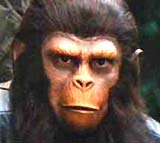 Milo/Caesar (Roddy McDowall) 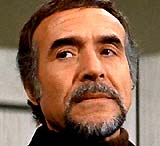 Senor Armando (Ricardo Montalban) 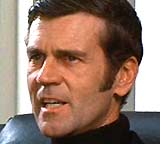 Governor Breck (Don Murray) 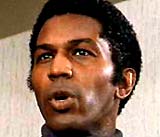 Mr. MacDonald (Hari (Harry) Rhodes) 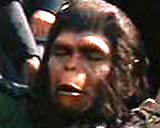 Aldo (David Chow) 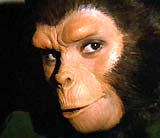 Lisa (Natalie Trundy)  Chief Inspector Kolp (Severn Darden) |